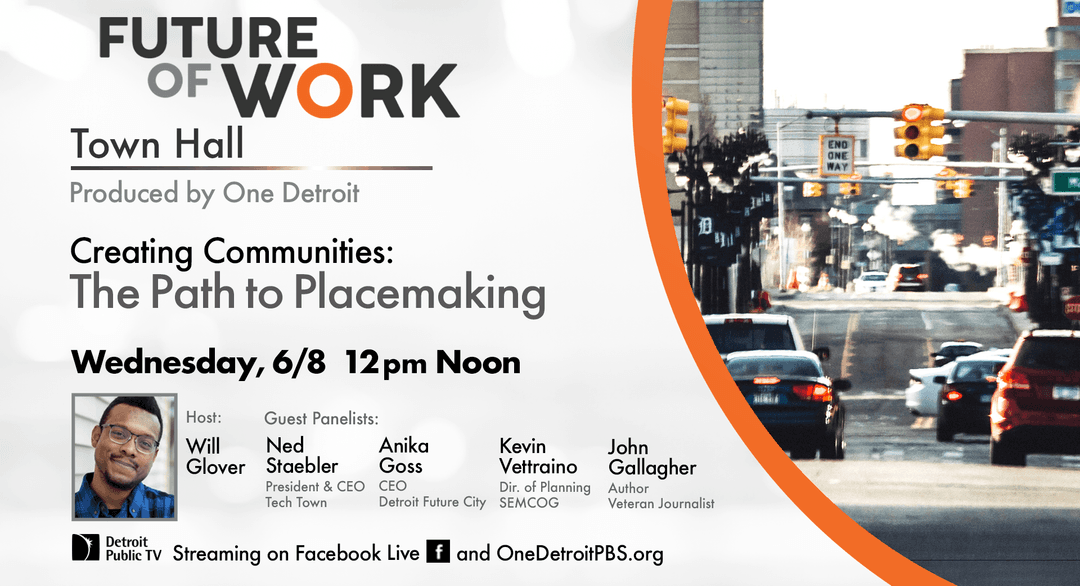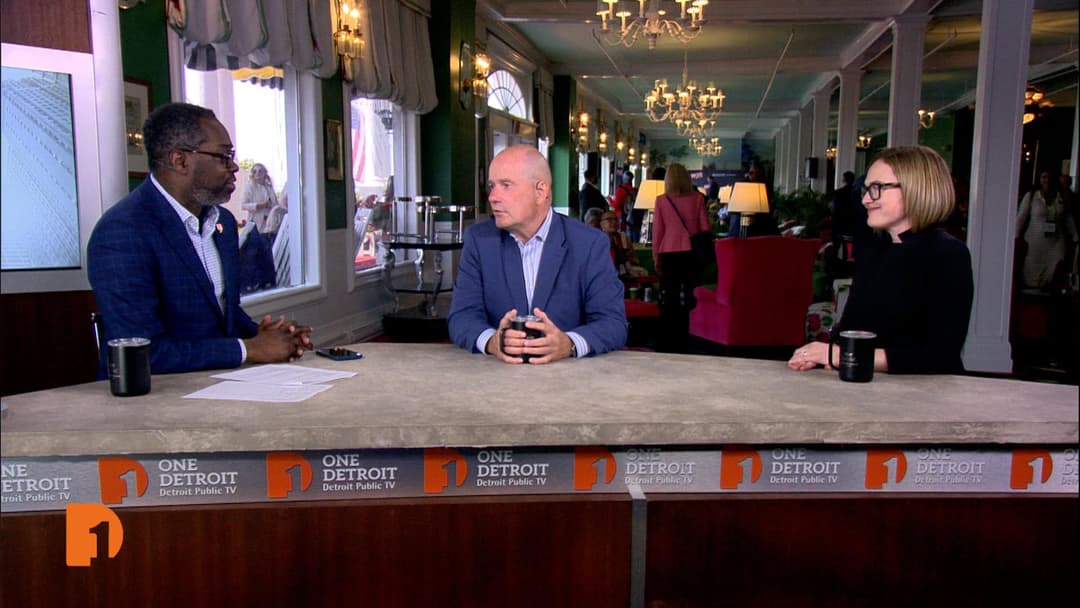Gen Xers are taking the lead. How will they shape the future of work?
Mar 16, 2023
Hidden from the spotlight until now, Gen Xers have quietly become the next generation of workforce leaders, rising to C-suite level positions, as they take on new roles and talk about hiring for positions that don’t exist yet. At the same time Gen Xers are juggling the heightened responsibilities at work, they’re navigating more responsibilities at home as they take care of kids and aging parents.
As Gen Xers take the helm where baby boomers have retired, how will their leadership styles and strengths continue to shape the future of work?
One Detroit producer and Future of Work host Will Glover spoke to Michigan Works Association! CEO Ryan Hundt about what the future looks like with Generation X in charge. They talk about the cohort’s most notable workforce trends, the value of Gen Xers in the office, and how often they’ve been promoted on average compared to other generations.
This conversation comes from One Detroit’s Future of Work town hall “Gen X: Picking up the Slack in an Evolving Workforce.” Watch our next Future of Work town hall on millennials Wednesday, March 22 at noon.
Full Transcript:
Will Glover, @WillofMichigan: Ryan, let’s just jump right in. Let’s set the table. What is the workforce landscape right now for someone who’s a Gen X? What level of job are they holding? What’s the next step for them in the workforce? Tell me a little bit about that.
Ryan Hundt, CEO, Michigan Works! Association: First and foremost, I’d like to talk about some trends that we’re seeing right now in the workforce. Just a few years ago, millennials surpassed Gen Xers as the largest generation in workforce in terms of just the sheer volume of workers that are currently engaged in the workforce in 2023. And with Baby Boomers either having retired or staring down retirement themselves, there’s plenty of older Gen Xers who are also kind of following suit with those Baby Boomers. Maybe they’re preparing for retirement themselves. We know that for the most part, Gen Xers will be in the workforce again for the next 10 to 30 years.
So, we need to make sure that they are continuing to have a significant impact in the workforce. Of course they certainly are. Gen Xers are now also entering their prime income ages. We know that typically the age 45 to 54 in the United States is typically the age demographic that sees the largest growth in terms of potential earnings over the course of that time period. So many of are either entering or has entered that prime income age as we speak. In addition to entering their prime income age, they’re also making up the majority of leadership positions across the workforce.
That’s not just here in Michigan or in the United States, but globally Gen Xers make up about 51% of leaders in organizations with an average of about 20 years of work experience. So, they’ve certainly followed that natural progression of going from entry level positions all the way up through middle management. Now it’s upper-level management in leadership positions in both the public and private sector.
Will Glover: How valuable are Gen Xers with that breadth of experience in the workforce already going to be for any kind of organization or company going into the future? Because, you know, they’re taking up the mantle for Boomers, but they just have so much more experience than a lot of Millennials.
Ryan Hundt: Really, they are kind of that forgotten middle child between the Baby b=Boomer generation and the Millennials. That’s just not my take. It’s not me speaking on my personal opinions, but I let the data speak for itself. Over the last several years, we’ve seen Gen Xers with an average promotion of only 1.2 promotions over a five-year period. That’s lower than both Millennials and Baby Boomers.
Will Glover: What does Michigan need to be doing to make jobs themselves, the work itself more attractive to get people to come here?
Ryan Hundt: Some things that Michigan can do, and I think Michigan does do quite well and we just really need to double down on those efforts is accentuating those positive attributes of our state. Many people may not know if they live outside of the Midwest, but Michigan has the largest shoreline of fresh water in the country. And we certainly look at our wonderful assets and our natural beauty is on par with other parts of the state, or other parts of the country, and other parts of the globe, quite frankly.
So, for folks that are looking for that workplay aspect where you’re never too far away from some of those outdoor amenities, but we also have a number of cultural assets that we continue to highlight. Institutions of higher learning for folks like myself who are big sports fans, big professional sports teams like the Red Wings, the Tigers, the Lions and the Pistons. Those are all key attributes that we just need to continue highlighting to folks that are outside of Michigan. Not just they come here to tour the state, but hopefully come here and relocate to the state so that we can continue to grow in population in the coming years.
Will Glover: If we do have a perfect marketing campaign. Pure Michigan is a global phenomenon, it goes viral. All the right things happen for us in the right ways. Are we ready as a state infrastructurally to handle an influx in population and people like that? Do we have the jobs? Do we have the amenities? Do we have the things that we need to get what we’re asking for?
Ryan Hundt: We certainly have the jobs. I don’t think that’s the issue here. We have an average of about 500,000 job openings in Michigan. Similar to many other parts of the country, there is way more job openings compared to the number of individuals searching for jobs. So, the jobs are certainly here. We would certainly encourage anybody that is interested in looking for their next professional journey to take a look at Michigan. We have a range of occupations and industries that are hiring, from advanced manufacturing, to IT, to health-care.
The jobs are certainly there. I think the infrastructure largely is there, and we are seeing some significant investments that have been outlined, perhaps, for example, in the Governor’s executive budget recommendations on advancing some objectives and investments into affordable housing, because that is always a concern, not just in Michigan but across the country. If we have workers come in, we need to make sure that they have places where they can live that are affordable, that are not outside of their reach for the salaries and wages that they are currently receiving.
So, that’s all very positive news from an infrastructure standpoint. And of course, as I mentioned to you before on this chat today, the cultural amenities, the natural assets are certainly all there as well. I think Michigan is primed for a very significant comeback in terms of population increases over the next few decades. I’m super bullish on our prospects as a state to reap the benefits of relocations from individuals that might be seeking a new opportunity in a climate like Michigan’s, that is very favorable toward that growth.
Stay Connected:
Subscribe to One Detroit’s YouTube Channel & Don’t miss One Detroit Mondays and Thursdays at 7:30 p.m. on Detroit PBS, WTVS-Channel 56.
Catch the daily conversations on our website, Facebook, Twitter @DPTVOneDetroit, and Instagram @One.Detroit
View Past Episodes >
Watch One Detroit every Monday and Thursday at 7:30 p.m. ET on Detroit Public TV on Detroit Public TV, WTVS-Channel 56.
Stay Connected
Subscribe to One Detroit’s YouTube Channel and don’t miss One Detroit on Thursdays at 7:30 p.m. and Sundays at 9 a.m. on Detroit PBS, WTVS-Channel 56.
Catch the daily conversations on our website, Facebook, Twitter @OneDetroit_PBS, and Instagram @One.Detroit
Related Posts
Leave a Reply
Your email address will not be published. Required fields are marked*





























